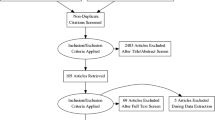Abstract
Objective
This study sought to identify and examine less commonly discussed challenges to positive mental health faced by medical students, residents, and physicians with hopes of improving current efforts to protect the mental health of these groups. Additionally, this work aimed to suggest an innovative means of preventing poor mental health during medical education.
Methods
Literature on medical student, resident, and physician mental health was carefully reviewed and a number of psychiatrists who treat physician-patients were interviewed.
Results
The culture of medicine, medical training, common physician psychology and identity, and conflicting professional expectations all seem to contribute to poor mental health among medical students, residents, and physicians. Many current efforts may be more successful by better addressing the negative effects of these characteristics of modern medicine.
Conclusions
Programs aimed at promoting healthy mental lifestyles during medical education should continue to be developed and supported to mitigate the deleterious effects of the challenging environment of modern medicine. To improve these efforts, educators may consider incorporating philosophical discussions on meaning and fulfillment in life between medical students and faculty. Through medical school faculty members sharing and living out their own healthy outlooks on life, students may emulate these habits and the culture of medicine may become less challenging for positive mental health.
Similar content being viewed by others
References
Zuger A. Dissatisfaction with medical practice. N Engl J Med. 2004;350(1):69–75.
Dyrbye LN, Thomas MR, Massie FS, Power DV, Eacker A, Harper W, et al. Burnout and suicidal ideation among U.S. medical students. Ann Intern Med. 2008;149(5):334–41.
Myers MF. The support and welfare of the student. In: Gask L, Coskun B, Baron D, editors. Teaching psychiatry: putting theory into practice. Chichester: John Wiley & Sons Ltd; 2011.
Dyrbye LN, Thomas MR, Shanafelt TD. Systematic review of depression, anxiety, and other indicators of psychological distress among U.S. and Canadian medical students. Acad Med J Assoc Am Med Coll. 2006;81(4):354–73.
CDC. Current depression among adults—United States, 2006 and 2008. MMWR. 2010;59(38):1229–35.
CDC. Suicidal thoughts and behaviors among adults aged ≥18 years—United States, 2008-2009. MMWR. 2011;60(SS13):1–22.
Goebert D, Thompson D, Takeshita J, Beach C, Bryson P, Ephgrave K, et al. Depressive symptoms in medical students and residents: a multischool study. Acad Med J Assoc Am Med Coll. 2009;84(2):236–41.
Schernhammer ES, Colditz GA. Suicide rates among physicians: a quantitative and gender assessment (meta-analysis). Am J Psychiatr. 2004;161(12):2295–302.
Center C, Davis M, Detre T, Ford DE, Hansbrough W, Hendin H, et al. Confronting depression and suicide in physicians: a consensus statement. JAMA J Am Med Assoc. 2003;289(23):3161–6.
Holsinger Jr JW, Beaton B. Physician professionalism for a new century. Clin Anat. 2006;19(5):473–9.
Pathman DE, Konrad TR, Williams ES, Scheckler WE, Linzer M, Douglas J. Physician job satisfaction, dissatisfaction, and turnover. J Fam Pract. 2002;51(7):593.
Leigh JP, Tancredi DJ, Kravitz RL. Physician career satisfaction within specialties. BMC Health Serv Res. 2009;9:166.
Myers MF. Physician suicide and resilience: diagnostic, therapeutic and moral imperatives. World Med J. 2011;57:90–7.
Schwenk TL, Davis L, Wimsatt LA. Depression, stigma, and suicidal ideation in medical students. JAMA J Am Med Assoc. 2010;304(11):1181–90.
Myers MF, Gabbard GO. The physician as patient: a clinical handbook for mental health professionals. Washington: American Psychiatric Publishing, Inc; 2008.
Personal communication with Reynolds III C. (used with permission), June 14, 2013.
Personal communication with Anzia J. (used with permission), June 12, 2013.
Personal communication with Myers M. (used with permission), June 10, 2013.
Personal communication with Sen S. (used with permission), June 17, 2013.
Reynolds 3rd CF, Clayton PJ. Commentary: out of the silence: confronting depression in medical students and residents. Acad Med J Assoc Am Med Coll. 2009;84(2):159–60.
System UoCSDH. Healer Education Assessment and Referral Program. [cited 2013 July 21]; Available from: http://health.ucsd.edu/specialties/wellbeing/Pages/default.aspx.
Wallace JE. Mental health and stigma in the medical profession. Health (Lond). 2012;16(1):3–18.
Montgomery K. How doctors think: clinical judgment and the practice of medicine. New York: Oxford University Press, Inc.; 2006.
Billing C. Dangerous fearlessness: the formation of physicians. A condition of doubt: the meanings of hypochondria. New York: Oxford University Press, Inc; 2012. p. 106–26.
Elliot C. Better than well: American medicine meets the American dream. New York: W. W. Norton & Company, Inc.; 2004.
Edelstein EL, Baider L. Role reversal: when doctors become patients. Psychiatr Clin. 1982;15(4):177–83.
Klitzman R. When doctors become patients. New York: Oxford University Press; 2008.
Landon BE, Reschovsky JD, Pham HH, Blumenthal D. Leaving medicine: the consequences of physician dissatisfaction. Med Care. 2006;44(3):234–42.
Fahrenkopf AM, Sectish TC, Barger LK, Sharek PJ, Lewin D, Chiang VW, et al. Rates of medication errors among depressed and burnt out residents: prospective cohort study. BMJ. 2008;336(7642):488–91.
West CP, Tan AD, Habermann TM, Sloan JA, Shanafelt TD. Association of resident fatigue and distress with perceived medical errors. JAMA J Am Med Assoc. 2009;302(12):1294–300.
Dyrbye LN, Massie Jr FS, Eacker A, Harper W, Power D, Durning SJ, et al. Relationship between burnout and professional conduct and attitudes among US medical students. JAMA J Am Med Assoc. 2010;304(11):1173–80.
Dyrbye LN, Harper W, Moutier C, Durning SJ, Power DV, Massie FS, et al. A multi-institutional study exploring the impact of positive mental health on medical students’ professionalism in an era of high burnout. Acad Med J Assoc Am Med Coll. 2012;87(8):1024–31.
Horwitz AV. Creating mental illness. Chicago: The University of Chicago Press; 2002.
Szasz TS. The myth of mental illness. Perennialth ed. New York: HarperCollins Publishers; 2010.
Kramer P. Myths of the blues. Why it’s a bad idea to romanticize depression. US News World Rep. 2005;138(19):62.
Acknowledgments
The author wishes to thank Dr. Alice Dreger, Dr. Tod Chambers, Dr. Charles Reynolds III, and Dr. Joel Frader for their support and guidance in preparing this article.
Disclosures
The author has no other affiliations or conflicts of interest to disclose.
Author information
Authors and Affiliations
Corresponding author
Rights and permissions
About this article
Cite this article
Keller, E.J. Philosophy in Medical Education: A Means of Protecting Mental Health. Acad Psychiatry 38, 409–413 (2014). https://doi.org/10.1007/s40596-014-0033-y
Received:
Accepted:
Published:
Issue Date:
DOI: https://doi.org/10.1007/s40596-014-0033-y




